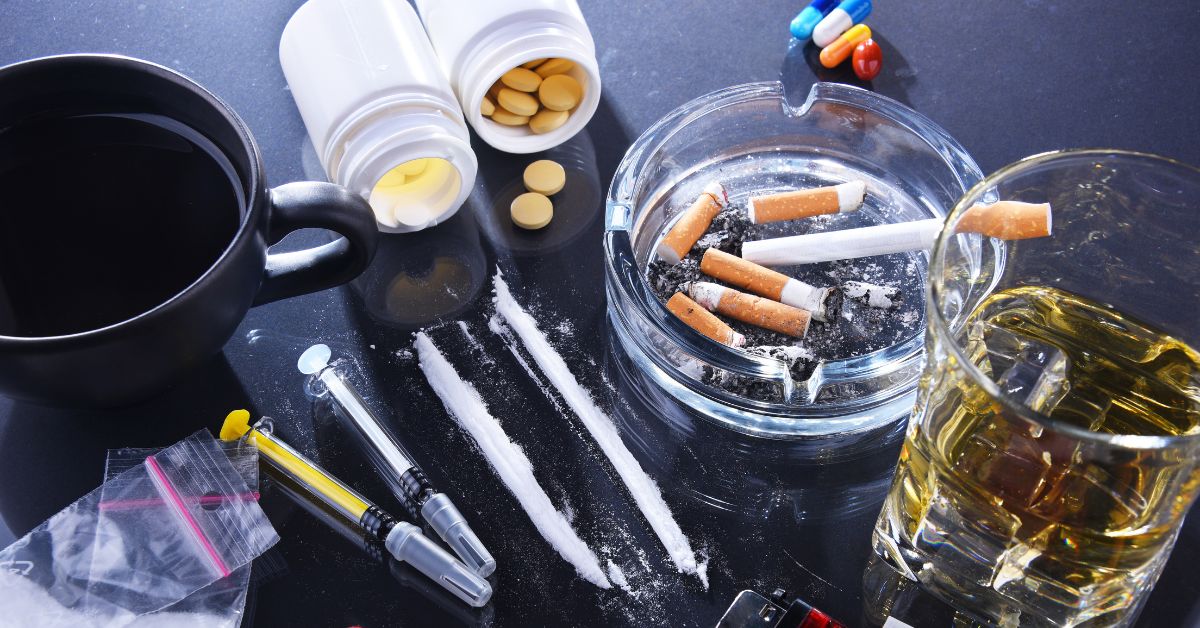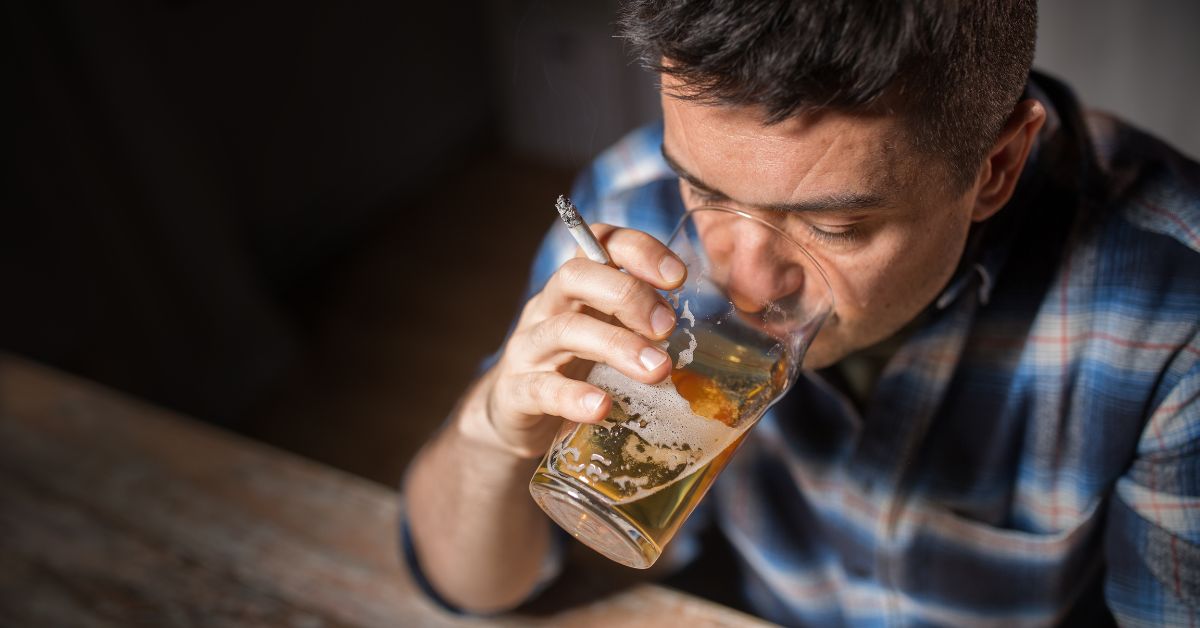Dealing with addiction can trigger feelings of shame, guilt, and loneliness. Those struggling with addiction may find it hard to acknowledge their mistakes. Instead, they tend to put the blame on others.
To help an addict take accountability for their actions is not simple, but it’s possible. In this article, you’ll discover why addicts often shift blame onto others and support them in overcoming it.
What is Alcoholism and Alcohol Use Disorder?
Let’s begin with the definition of alcoholism, a widespread problem with many consequences.
Alcoholism refers to mental and physical dependency on alcohol. Alcohol Use Disorder is a more general term for problematic drinking behavior. Regardless of the term used, both conditions can impact a person’s life.
The physical and psychological effects are often devastating. They range from liver damage and cardiovascular problems to depression and anxiety disorders.
It’s important to recognize that various factors contribute to developing addiction. Genetics, environment, dysfunctional family dynamics, and mental health issues can all have an impact. These causes can be triggers for developing many impulsive conducts.
Comparing Alcoholism and Drug Dependence

Though both are harmful habits, their effects, manifestation, and severity vary. Society’s perceptions and legal implications also change, often contributing to the problem.
Helping an alcoholic child may present unique challenges. Treatment approaches for both conditions depend on the substance and the individual’s circumstances.
The following table shows the differences between these two challenging conditions:
| Alcoholic Use Disorder | Drug Dependence | |
|---|---|---|
| Physical Effects | Damage to the liver and cardiovascular disease. | Varies depending on the drug (e.g., lung damage, cardiac issues). |
| Psychological Effects | Often linked to depressive symptoms and anxiety. | From anxiety and depression to insomnia, paranoia, or hallucinations. |
| Social Perception | Often viewed as less severe due to the broad social acceptance of alcohol. | Generally carries a heavier stigma due to its association with criminal conduct. |
| Treatment | Rehabilitation, managing withdrawal symptoms with medication, therapy, etc. | Rehabilitation, medication-assisted therapy, and help from support groups. |
The Impact of Substance Abuse
Alcoholism and drug addiction have consequences on others as well. Dealing with a drug addict son or helping a drug addict daughter can be overwhelming. At this point, you might be feeling a lot of stress from this situation.
Substance dependence also affects loved ones. Families often feel guilty and experience emotional distress, financial problems, and relationship issues. They also bear the blame for allowing harmful conduct at home, widening the emotional gap.
Emotional Impact on Families
Living with an alcoholic or drug addict can take a massive emotional toll on family members. This struggle manifests like:
- Constant worry about the individual’s health and well-being.
- Frustration and other intense emotions about their actions.
- A feeling of helplessness toward the situation.
- Self-reproach and guilt surrounding the individual.
- A sensation of tip-toeing around to prevent any unexpected reactions.
FREE: Get the 3 pieces of advice that helped me understand this disease of addiction
Impact on Family Relationships
Substance misuse can reshape the dynamics within a family in the following ways:
- Strained relationships are due to repeated deception or lying.
- Broken trust leads to resentment or distance.
- Overbearing pressure on family bonds due to recurring crises.
- Shifts in roles within the family, such as children caring for intoxicated parents.
Financial Consequences
Addiction can have intense and tangible effects on the addict’s finances, such as:
- Job loss or unstable income due to unsatisfactory performance.
- Increased debt or drained savings after treatment expenses or buying substances.
- Inability to buy groceries, meds, or other essential products.
Understanding Why Alcoholics and Addicts Blame Others

When someone is struggling with addiction of any kind, the disease of addiction takes control. Their whole life revolves around getting and using the substance. One typical behavior of addicts is to blame anyone but themselves.
This limits individuals from being accountable for their actions. It also enables them to evade the realities of their situation. It’s hard for people with addiction to confess they have a problem. It is easier to blame others, circumstances, or even bad luck for their addiction. Guilt-tripping is simply a mechanism of the disease.
Addiction and Guilt
When suffering from addiction, individuals often struggle with immense guilt and remorse. Unfortunately, instead of seeking help, they shift this blame onto those around them. There are several ways in which this issue takes form:
- Accusing others: An addict attributes bad habits to challenging circumstances. They believe that others are the source of their distress and the consequent need to drink or get high.
- Claiming lack of support: They believe no one understands or supports them.
- Deflecting responsibility: They blame circumstances for the problems linked to relapse.
It’s common that addicts to refuse to take responsibility for their actions. They do this in an attempt to maintain the cycle of addiction without feeling like they’re doing wrong.
UPDATED: Discover the 3 life-changing things about addiction I wish I knew years ago
The Role of Manipulative Behavior
Blaming others is a common sign of manipulation. It serves to prevent the manipulator from taking full responsibility. This coping mechanism can fuel their addiction and prevent them from facing consequences. If you feel guilt and shame around a manipulator, you may be familiar with these tactics:
- A false representation: Addicted people often conceal the severity of their habit. They provide dishonest justifications to safeguard their dependency.
- Blaming others: They make others feel responsible for their struggles. It leads those around them to enable addiction.
- Playing the victim: They can make a big thing of their problems or portray themselves as the “underdog.” This can help them gain sympathy, further covering up guilt.
Recognizing Denial in Alcohol and Drug Use Disorder
Denial and avoidance of their responsibilities are common when someone has an addiction. This defense mechanism keeps them under the illusion that everything is under control.
Understanding why addicts blame others rather than themselves is essential to respond. It’s crucial to remember that this conduct is part of the disease. It doesn’t reflect the person’s true character or feelings.
Setting boundaries and seeking professional help for your loved one can bring change. Understanding the situation will prevent you from having a co-dependent relationship.
Overcoming Denial

The most difficult challenge in the battle toward rehab is to convince someone to get help. It can create an intimidating barrier to acknowledgment and recovery.
An addict is not a bad person. Chemical imbalances and impulsive feelings influence their decision-making. Overcoming this damaging conduct is a critical step in the healing journey.
The Power of Acceptance in Overcoming Addiction
You can’t ignore the significance of recognizing the problem. Acceptance does several crucial things:
- It shatters the illusion of control that many people maintain over their habits.
- It offers a platform for remorse and change.
- It opens up the pathway to seeking help and starting recovery.
WATCH: Free, confidential workshop that explains how to "Love Another Way"
Confronting the Situation:
You can use different strategies to help with denial, which may include:
- Open, non-judgmental communication about the observed behaviors and their effects
- Gentle yet firm insistence on the reality of the problem.
- Seeking professional help, including interventions or counseling.
- Encouragement toward self-reflection and acceptance.
Professional Help: The Importance of Therapy
Professional help often plays a critical role in the stage of change. Through counseling or therapeutic interventions:
- People can get an unbiased understanding of their situation.
- They can understand the underlying issues that may be triggering.
- They may gain motivation to accept their condition and accept being sober.
Dealing with Manipulative Actions

To maintain unhealthy habits, an addict may use different tactics of manipulative behavior. Recognizing them can protect everyone from emotional harm.
Recognizing Calculating Attitudes
Some people often use various tactics, including, but not limited to:
- Fear: An addict can threaten with severe consequences if you seek help.
- Guilt: They suggest that they’ll be unable to cope or that their life will fall apart, blaming others.
- Deception: They lie about their substance use and break promises about quitting.
- Gaslighting: They attempt to make everyone question their understanding of the situation.
Strategies to Break the Cycle
Responding to manipulation requires a level-headed demeanor and consistency. You can consider several techniques:
- Set Clear Boundaries: Provide clear limits. Also, establish consequences if they fail to respect your boundaries.
- Seek Information: Have a better insight into their problems and the tactics they may use. This will help you to avoid taking care of those issues.
- Focus on Your Needs: Self-care is not selfish; it’s necessary.
- Reach Out for Help: Connect with support groups or healthcare professionals. They will provide guidance and relief.
Coping with Manipulation Long-term
When helping your loved one, the goal is not to fight against them. It’s vital to remember that resources and support are available. You can set healthy boundaries, attend support groups, and encourage therapy.
Moving Forward: The Need to Overcome Addiction

Addiction is not a choice, a sign of weakness, or moral failure, but a medical condition. The adventure of fighting against addiction is challenging. But, it promises countless rewards surpassing the immediate gratification of substance use.
When your loved one overcomes addiction, they move toward an improved quality of life. Remember to seek support from family and professionals. They will help you toward renewed self-worth and a better life. Not only does this benefit your loved one, but also everyone around you.
Frequently Asked Questions: Why Do Addicts Blame Others?
Can drugs cause narcissism?
While drugs don’t cause narcissism, prolonged drug use can lead to narcissistic behaviors. Addiction encourages a self-centered attitude as the addict’s primary focus becomes substance use. It’s crucial to distinguish between this sign and Narcissistic Personality Disorder.
What type of personality do addicts have?
Addiction does not adhere to a specific personality type and can affect anyone. But, certain personality traits are often seen in addicts. They vary from impulsivity, sensation seeking, and high levels of distress. Someone’s personality can impact how addiction manifests and the steps necessary for recovery.
SEE: Find out why your boundaries keep getting crossed (and how to reinforce them)
Why do drug addicts lack empathy?
Drug or alcohol users appear to lack empathy because of substance influence. Constant drug consumption often takes precedence, emphasizing the addict’s insensitivity to others’ feelings. Yet, this does not mean they are incapable of feeling empathy.
Do addicts have anger issues?
Yes, many people with addiction struggle with anger issues. This can be due to withdrawal symptoms and frustration from their situation. Anger can worsen addiction, as some individuals may use substances as a way to cope with anger issues. Effective treatment programs often address anger management as a critical component of recovery.
